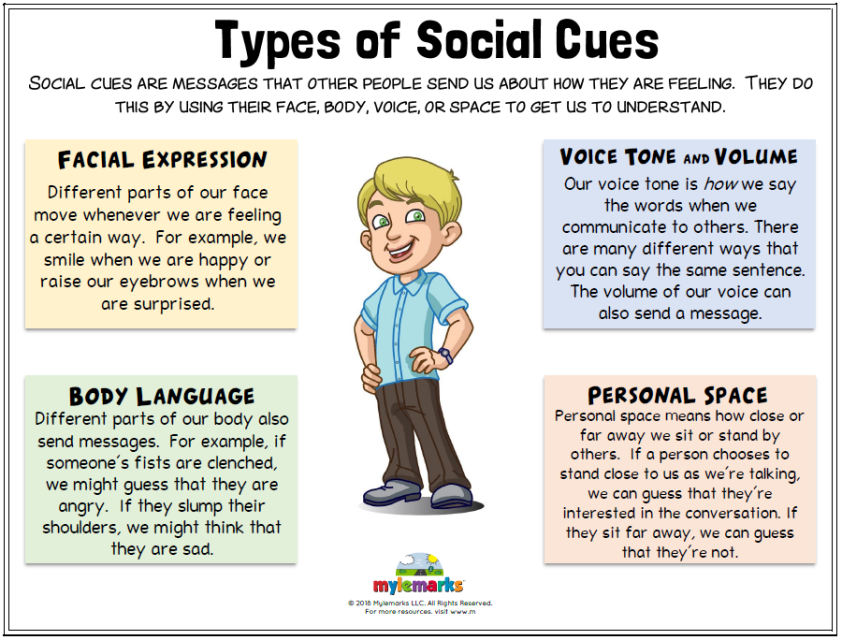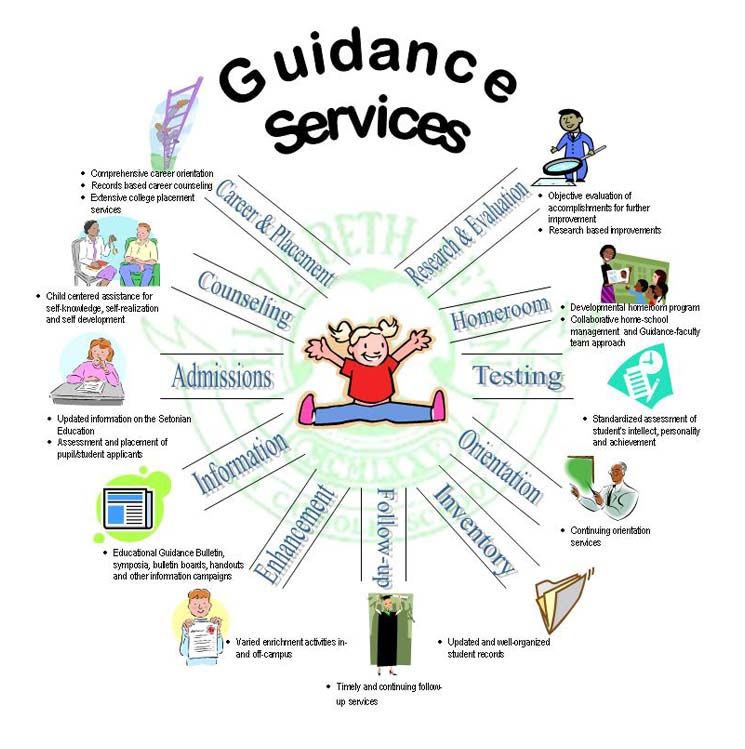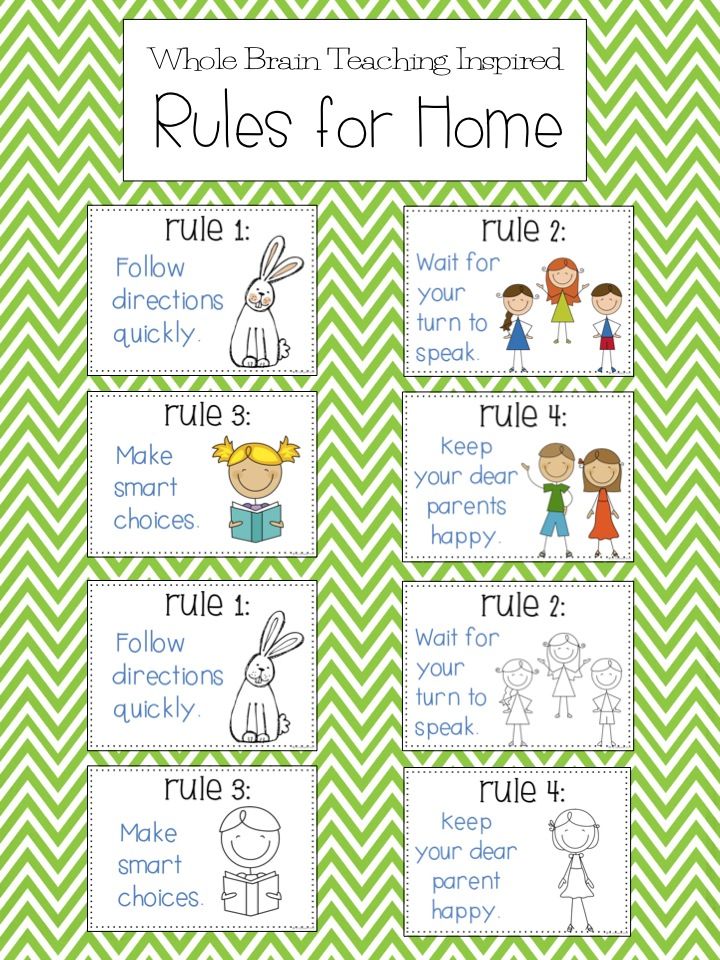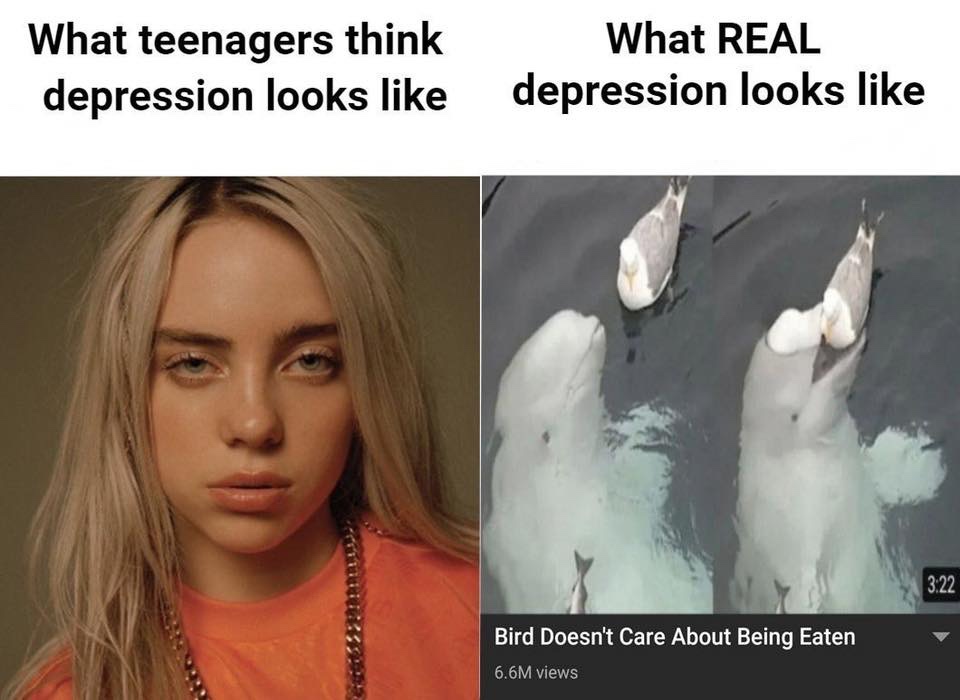The stages of grief after a death
The 5 Stages of Grieving: Dealing with Death of a Loved One
The pain when someone you love dies is unexplainably unbearable. You ask yourself, “Will this pain ever end?” You may have feelings of shock, anger, profound sadness, confusion, and disbelief. Grieving is a normal response to loss. There’s no right or wrong way to grieve, but there is a healthy process of dealing with the death of a family member or close friend.
Elisabeth Kübler-Ross, a renowned psychiatrist, developed a theory called “The Five Stages of Grief.” The process involved when dealing with a loved one’s death is called “DABDA,” which stands for denial, anger, bargaining, depression, and acceptance. The five stages of grief do not only apply when dealing with the death of a loved one; it also applies to divorce, perceived significant life changes, miscarriage, job loss, or the diagnosis of a terminal illness.
The 5 Stages of the Grieving Process
This article will focus on the stages of the grieving process when dealing with the death of a loved one. There is no specific time frame for getting over the loss of a dearly beloved.
Not all who experience the loss of a special person will go through all stages of grief, and that’s okay. You don’t have to go through all these five stages of grief. The theory was developed as a guide to give us an idea of which emotions are experienced in grief. The theory also answers your questions about why you’re feeling the way you are after losing someone.
1. DenialDenial is the first stage of the grief experience. What is your first response when you hear the news that someone died? It’s most likely disbelief. You can’t seem to properly face the reality of the situation, especially if the death is sudden or you just talked to that person yesterday.
The denial stage is an attempt to absorb and understand the news. It’s a common defense mechanism in the grief process to survive the pain. It is the stage where you take the time to adjust to the new reality. This is the time when you question yourself on how to go forward through life without this person’s presence.
This is the time when you question yourself on how to go forward through life without this person’s presence.
A common response when someone dies is anger. This stage of grief can last for days, weeks, or even months. This stage may also involve feelings of frustration, anxiety, loneliness, and uncertainty.
In the anger stage, you find yourself blaming the doctors, caregivers, God, or even yourself if there is something you could have done to avoid the death of your loved one. There are so many questions that cross your mind, like why is this happening to you. You feel the anger rise as you ask more questions.
There’s so much emotion in the new reality to process that you use anger to avoid or confront the situation. When you feel angry, try to seek help from friends or other family members. Remember that you do not grieve alone; other people in your life are experiencing pain, too. This is the time to be there for each other, and together you can deal with your anger issues.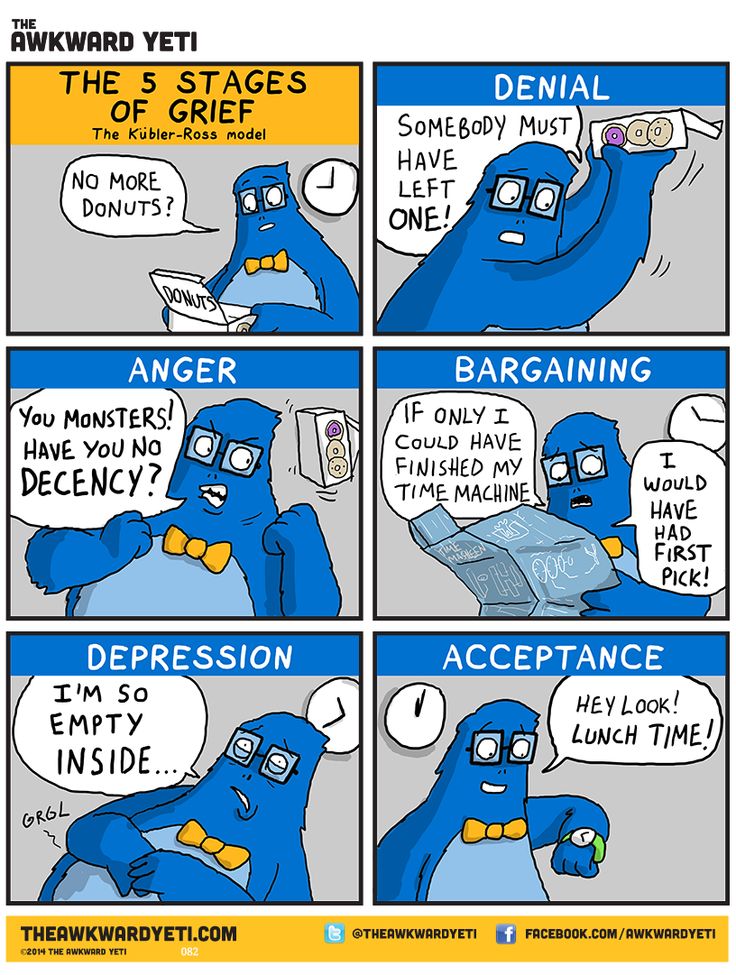
This is the stage where you tell yourself, “I would do anything just to bring my dearly beloved back.” You may keep asking yourself “what if” questions. These are moments when you feel desperate to do almost anything or bargain anything to have that loved one back.
During the bargaining stage, you may tend to look back on the moments you spent with your dearly beloved. You recall the times when you had misunderstandings or caused your dearly beloved pain. How you wish you could turn back time and behave differently.
You may be in a painful place where you’ll do anything to turn back time. During this stage after the loss, remember to take it easy on yourself. Please do not blame yourself or other people for what happened and try to accept the loss slowly.
4. DepressionThe fourth stage of the grieving process after a loss is depression. The denial, anger, and bargaining start to dwindle as you slowly begin to face the situation.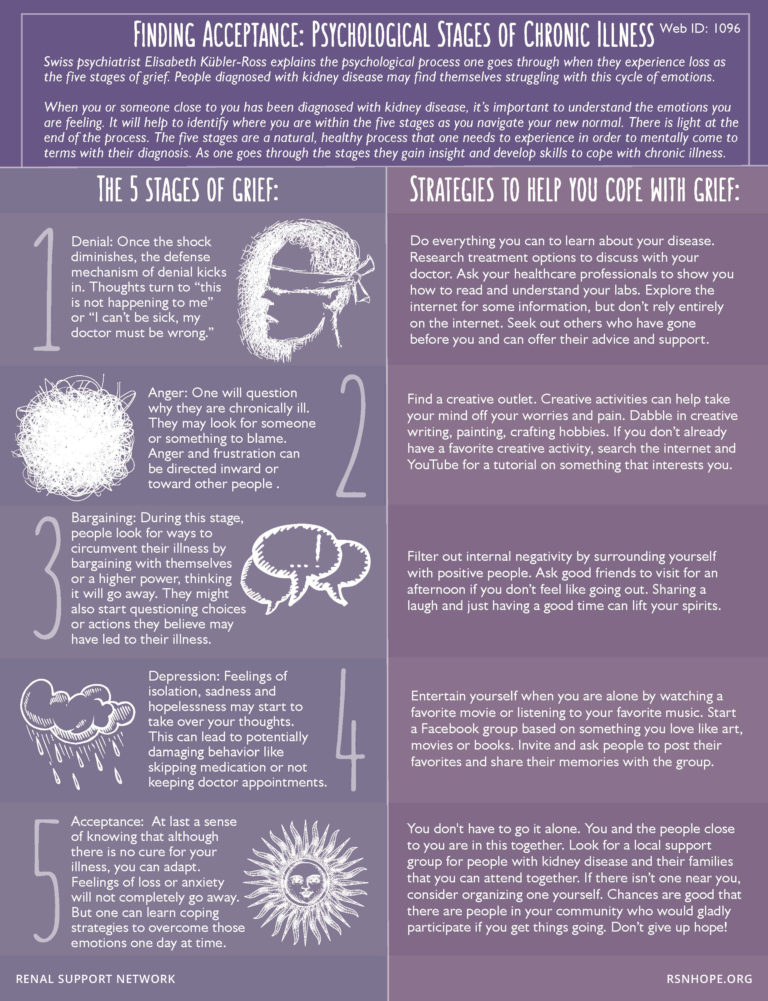 The feelings of sadness grow, and the pain is unavoidable at this point. Going through depression after a friend or family member’s death may cause you to become less sociable and affect your eating and sleeping patterns.
The feelings of sadness grow, and the pain is unavoidable at this point. Going through depression after a friend or family member’s death may cause you to become less sociable and affect your eating and sleeping patterns.
During the depression stage, don’t let your grief get the best of you. Avoid isolating yourself and get the help you need. Talk to a loved one or a mental health professional to learn how to cope with the loss healthily.
5. AcceptanceThe acceptance stage starts when you no longer struggle with facing the reality of the situation. You still feel pain and still cry, but you begin to accept the reality of your loved one’s death. The acceptance stage doesn’t necessarily mean that you’re totally okay, but you have accepted to go on with life while acknowledging the loss.
It’s like telling yourself, “My husband died, but eventually, I will be okay.” You start to accept that life goes on, and despite the pain and grief, you have to move on.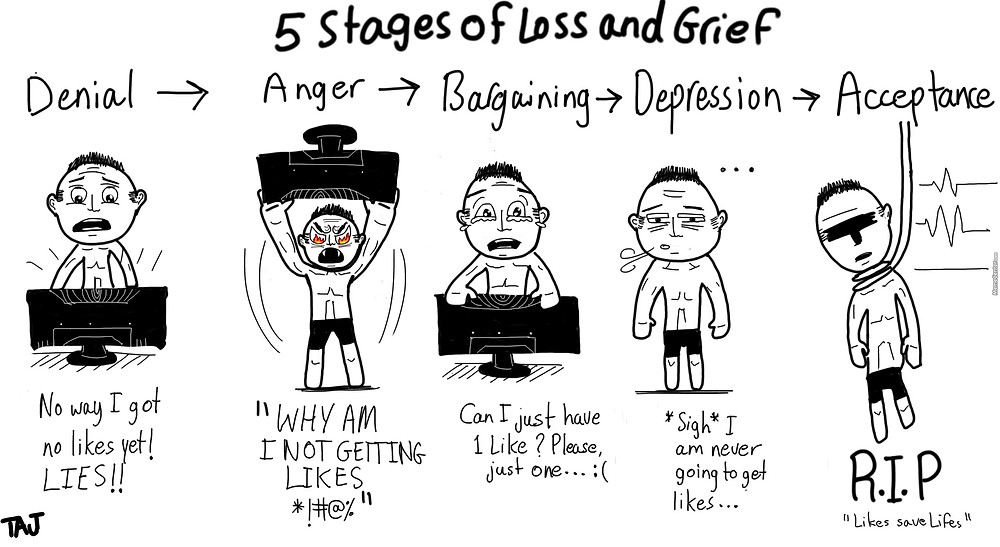 This is where you start to keep yourself busy with productive ways to spend your day. Tell yourself that you have an angel guiding you in everything you do.
This is where you start to keep yourself busy with productive ways to spend your day. Tell yourself that you have an angel guiding you in everything you do.
How to Grieve Healthily After the Loss of a Loved One
There is no wrong or right way to grieve, but there is a healthy way to express grief. If you recently experienced the loss of a dearly beloved, the key is not to isolate yourself from those who can support you.
As you experience grief, you may find yourself preferring to withdraw yourself from others. You will find it easier to deal with the loss if you have your friends and family with you. You don’t need to talk about the loss every time you interact with them. Just being in their presence is good enough.
If you recently experienced a loss, try to avoid unhealthy behaviors like drinking too much and substance abuse. Try to live a productive life, focus on what you have, spend time with your family, take care of your physical and mental health, and look forward to healing from the pain.
Try to accept the grief by drawing comfort in your faith, joining a support group, or talking to a counselor. If you need to talk to someone and learn how to live with grief, schedule an appointment with Kentucky Counseling Center now. Our therapists will help you process your grief so you can eventually look forward to happy days ahead.
Physical Symptoms, Effects on Body, Duration of Process
Written by WebMD Editorial Contributors
In this Article
- What Are the Stages of Grief?
- How Long Is Too Long to Mourn?
- Do I Need Professional Help?
Grief is a natural response to losing someone or something that’s important to you. You may feel a variety of emotions, like sadness or loneliness. And you might experience it for a number of different reasons. Maybe a loved one died, a relationship ended, or you lost your job. Other life changes, like chronic illness or a move to a new home, can also lead to grief.
Everyone grieves differently.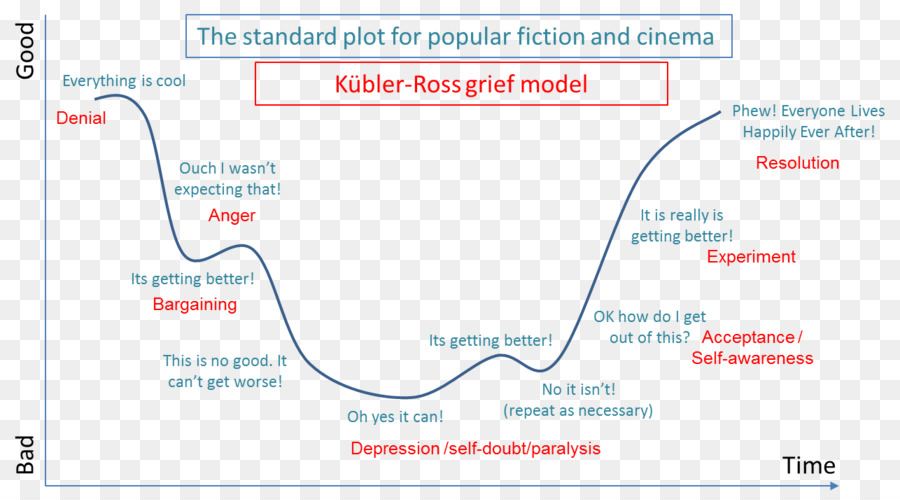 But if you understand your emotions, take care of yourself, and seek support, you can heal.
But if you understand your emotions, take care of yourself, and seek support, you can heal.
What Are the Stages of Grief?
Your feelings may happen in phases as you come to terms with your loss. You can’t control the process, but it’s helpful to know the reasons behind your feelings. All people experience grief differently. Though it it no longer considered the ideal way to think about grief, you may have heard of the stages of grief:
- Denial: When you first learn of a loss, it’s normal to think, “This isn’t happening.” You may feel shocked or numb. This is a temporary way to deal with the rush of overwhelming emotion. It’s a defense mechanism.
- Anger: As reality sets in, you’re faced with the pain of your loss. You may feel frustrated and helpless. These feelings later turn into anger. You might direct it toward other people, a higher power, or life in general. To be angry with a loved one who died and left you alone is natural, too.
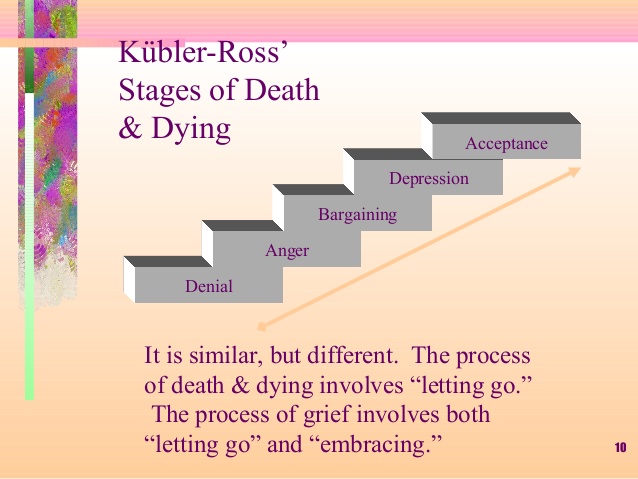
- Bargaining: During this stage, you dwell on what you could’ve done to prevent the loss. Common thoughts are “If only…” and “What if…” You may also try to strike a deal with a higher power.
- Depression: Sadness sets in as you begin to understand the loss and its effect on your life. Signs of depression include crying, sleep issues, and a decreased appetite. You may feel overwhelmed, regretful, and lonely.
- Acceptance: In this final stage of grief, you accept the reality of your loss. It can’t be changed. Although you still feel sad, you’re able to start moving forward with your life.
Every person goes through these phases in their own way. You may go back and forth between them, or skip one or more stages altogether. Reminders of your loss, like the anniversary of a death or a familiar song, can trigger the return of grief.
How Long Is Too Long to Mourn?
There’s no “normal” amount of time to grieve.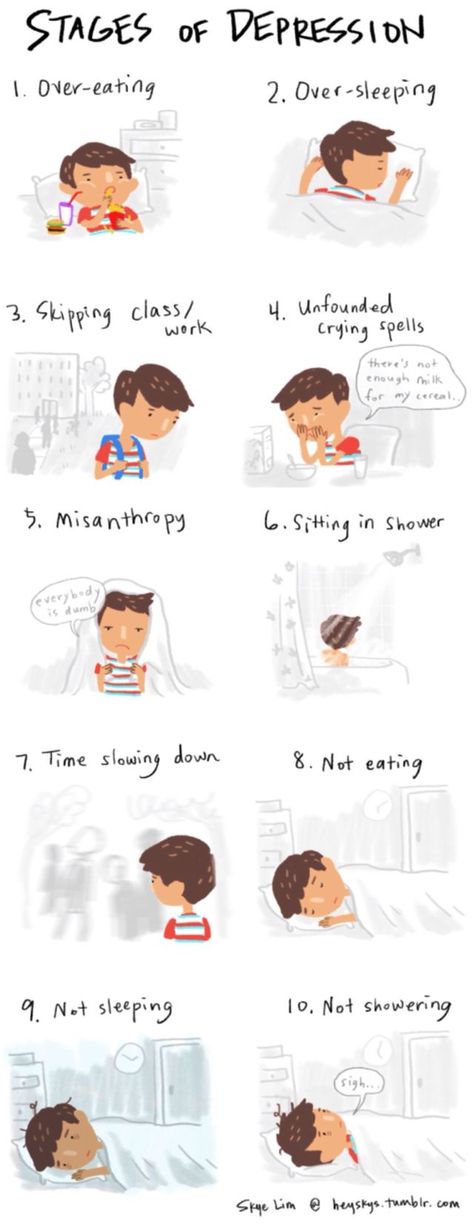 Your grieving process depends on a number of things, like your personality, age, beliefs, and support network. The type of loss is also a factor. For example, chances are you’ll grieve longer and harder over the sudden death of a loved one than, say, the end of a romantic relationship.
Your grieving process depends on a number of things, like your personality, age, beliefs, and support network. The type of loss is also a factor. For example, chances are you’ll grieve longer and harder over the sudden death of a loved one than, say, the end of a romantic relationship.
With time, the sadness eases. You’ll be able to feel happiness and joy along with grief. You’ll be able to return to your daily life.
Do I Need Professional Help?
In some cases, grief doesn’t get better. You may not be able to accept the loss. Doctors call this “complicated grief.” Talk to your doctor if you have any of the following:
- Trouble keeping up your normal routine, like going to work and cleaning the house
- Feelings of depression
- Thoughts that life isn’t worth living, or of harming yourself
- Any inability to stop blaming yourself
A therapist can help you explore your emotions. They can also teach you coping skills and help you manage your grief.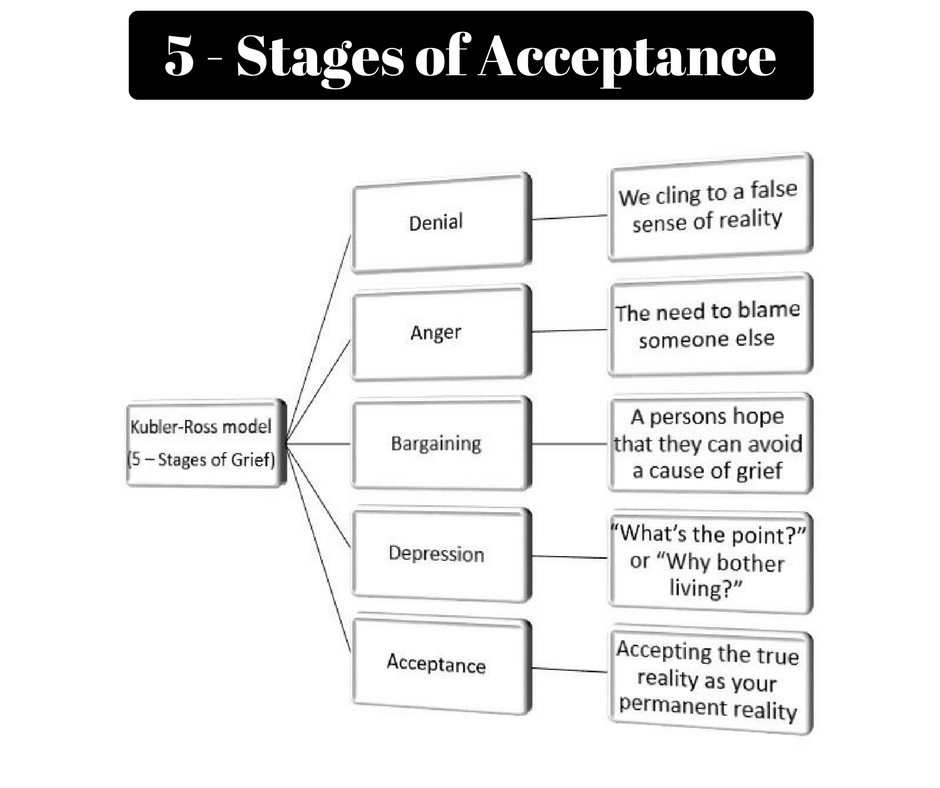 If you’re depressed, a doctor may be able to prescribe medicines to help you feel better.
If you’re depressed, a doctor may be able to prescribe medicines to help you feel better.
When you’re in deep, emotional pain, it can be tempting to try to numb your feelings with drugs, alcohol, food, or even work. But be careful. These are temporary escapes that won’t make you heal faster or feel better in the long run. In fact, they can lead to addiction, depression, anxiety, or even an emotional breakdown.
Instead, try these things to help you come to terms with your loss and begin to heal:
- Give yourself time. Accept your feelings and know that grieving is a process.
- Talk to others. Spend time with friends and family. Don’t isolate yourself.
- Take care of yourself. Exercise regularly, eat well, and get enough sleep to stay healthy and energized.
- Return to your hobbies. Get back to the activities that bring you joy.
- Join a support group. Speak with others who are also grieving.
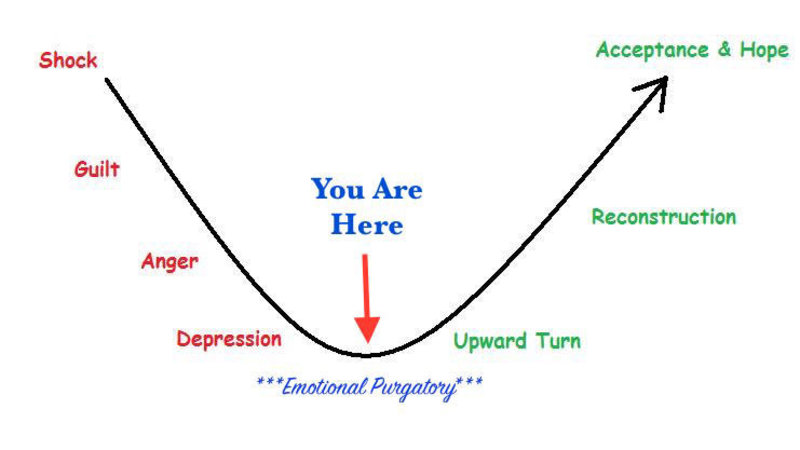 It can help you feel more connected.
It can help you feel more connected.
how to pass them correctly - Orthodox magazine "Foma"
Approximate reading time: 11 min.
-
100%
+
Embed code
Code copied
Mourning is not just a general description of the state of a person who is experiencing a loss. It is important to understand that this is a whole process, which, if a person goes through it without critical failures, helps to cope with a new reality that is catastrophic for him. That is why psychologists have long been carefully studying how this process works, describing the stages of grief. Knowing these stages is important for assessing how a person who is faced with the loss of a loved one is able to survive it without risks to physical and mental health, and in what cases he needs special help - relatives, specialists, priests. And not abstract help, but effective help at this stage.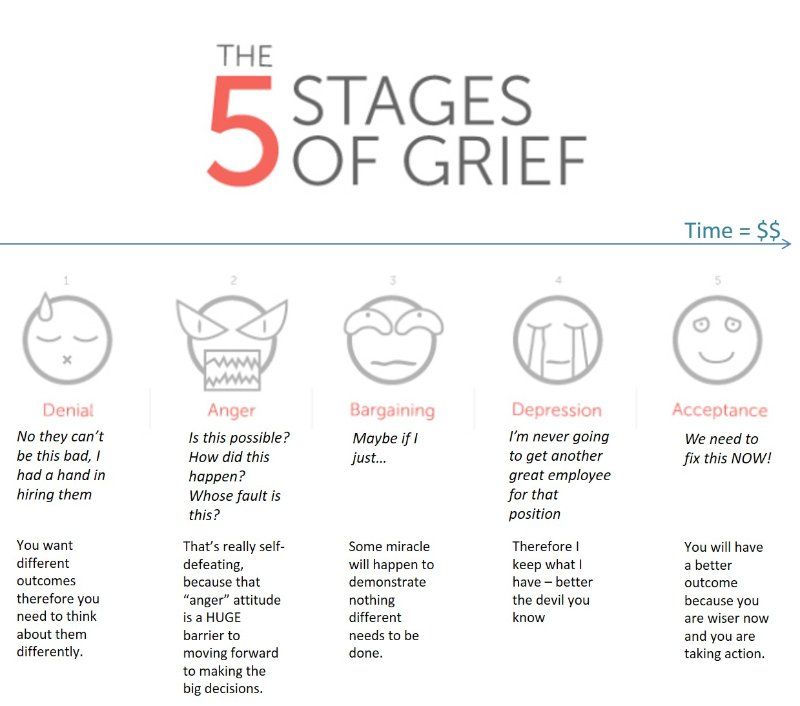
Grieving is not always overcome step by step and according to the sequence given below. For someone, everything goes exactly as the researchers said, for someone - partially so, for someone - individual stages are repeatedly repeated, and someone lives through the stages of grief in a completely different way. But the general patterns and characteristic features of the process are always recognizable.
What are the stages of grief, what does a person experiencing loss feel and how can you support him, tells Elena Kartavenko, psychologist at the Word and Deed Charitable Foundation.
Stage 1. Shock
At the first moment after the loss, a person experiences a shock. This is a protective reaction of the body, similar to the reaction to physical injury: its main goal is to reduce pain. A person understands what is happening with the mind, but cannot believe what has happened. Unable to comprehend loss. Can't accept it, it takes time. Shock is the first hours, days. Rarely weeks.
Shock is the first hours, days. Rarely weeks.
The stage is characterized by:
- Tears.
- Lamentations, questions to the deceased: “how could/could you?!”, “What should I do now?!”. Completely unthinkable claims to the deceased may appear.
- Denial. Sometimes the first stage is called the stage of denial, because this is how many people experience shock. “This can’t be!”, “This is a mistake!”, “Let me go to intensive care!”.
- Numbness. Inhibition of reactions. A person looks at one point (and in fact inside himself: he is in a parallel reality - where the deceased is still alive), it is very difficult for him to perceive any information. He can forget if he ate today - there is no feeling of hunger. He can forget a lot. There are no feelings either - this is a period of "mental anesthesia".
- Sleep disturbance. Restless sleep. In the early days, people are sometimes forced to take a sedative in order to fall asleep.
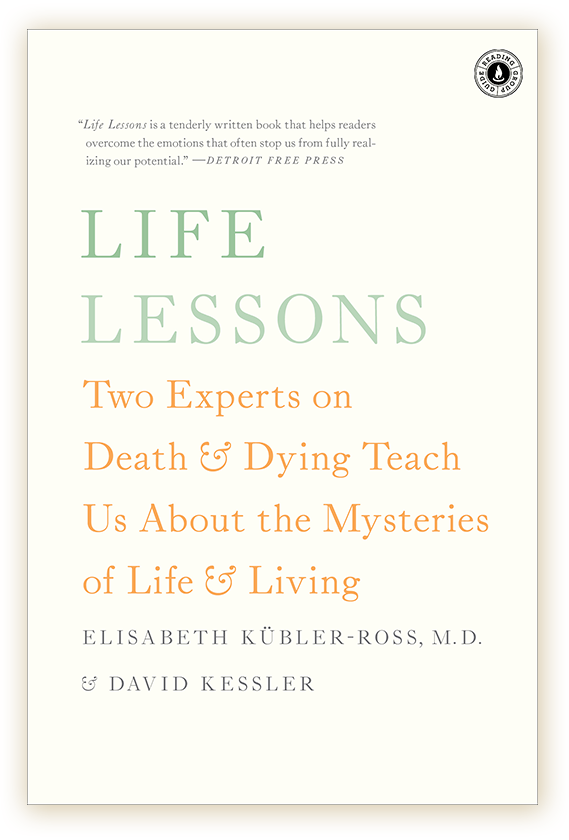
- Fear of the dark. In adults, this phenomenon is short-term, but nevertheless: people do not turn off the lights or turn off the TV.
- Duration: up to 9-12 days.
If you are reading these lines, being next to a person experiencing a loss, it is important:
- Accept his condition. It is useless to tell him “calm down”, “pull yourself together”, “life goes on”, to call for rational and logical thinking. This is now impossible for him.
- Stay close, do not leave the grieving person alone for at least the first week or until the shock stage has passed.
- Check if there is food in the refrigerator, if he has had water or tea for a long time, when he last ate. Drink, feed, cover with a blanket.
- If he is on medication all the time (and you know about it), ask when and if he took it.
- Feed the children if they are at home.
- Pay special attention to the condition (feeling unwell, quality of sleep) the first night after the loss and the night before the funeral.

- Try to involve him in simple everyday or ritual activities: listen or read the Psalter, look for documents, photographs.
- Offer to go to church, pray, arrange a funeral service. This is important not only for the deceased, but can also support the living, reminding that the death of a person is a birth into eternal life. Talk to the priest.
| Read also:
What is a funeral service? What is its meaning?
- If the grieving person organizes farewells, funerals and funerals, go with them. Your support, advice or even silent presence will definitely come in handy.
All this helps to survive the very first days. For many, it is difficult times that become the reason for turning to church life - people find comfort in this. Often a grieving person comes to the understanding that only God can help him overcome grief, and he goes to Him to seek help and protection.
Stage 2.
 Finding compromises
Finding compromises At this stage, the bereaved tries not so much to deny the fact of death as to deny the permanence of the loss, as if something else could be changed. There is an illusion that "I will do his / her business, and everything will be fine", "you have to be patient a little, and everything will work out."
The stage is characterized by:
- An attempt to bargain. “God, if he were alive, I would never be angry with him again.”
- Hyperactivity, activity.
- Frequent mood swings, emotional swings: today it's easier, but the next day it's sad again, and again strong feelings, as if everything happened just yesterday.
- Frustrated expectations of changes (return to the past) that will never come.
- Duration: up to seven weeks.
How can you help during this period?
- Be close, be in touch.
- Establish regular assistance: order delivery (food, household chemicals), take or pick up children from school or club.
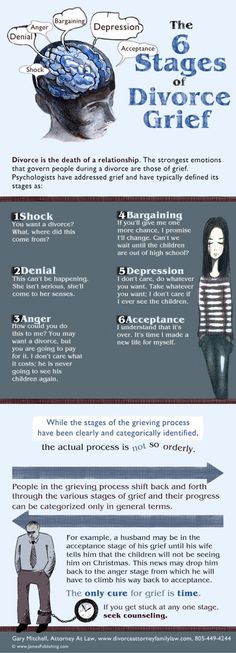
- Offer to go out for a walk, “walk”. If the person refuses, simulate situations where you need company or help. Walking helps in stressful situations to relieve tension a little, start breathing deeply and correctly - this helps to feel better.
- If it's within your power, watch your daily routine. Especially if the mourner lives alone. There is a big risk that he will forget to eat or go to bed on time. Fatigue and impotence will accumulate, and physical strength for living grief is very necessary.
- Go to the cemetery together. Even if a person wants to be alone, wait for him in the car, but see him off. You can negotiate with the priest from the nearest church, he will serve a memorial service at the grave (a short service with a request for the repose of the deceased in the Kingdom of Heaven).
- If the mourner is very active, try to direct at least part of this energy to active mourning - prayer. The realization that he can do at least something for the deceased (in fact, prayer is very important for the deceased) can become the straw that keeps a person afloat.
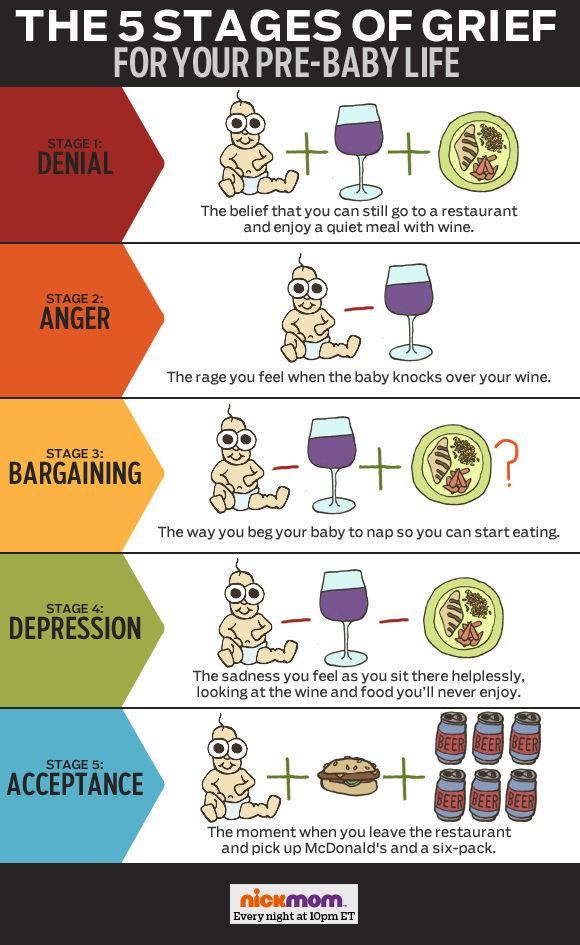
| Read also:
What can we do for the departed? Help organize magpies if they are planned. At the third stage, a person's consciousness begins to slowly come into contact with reality, which causes despair. This is a time of great heartache. And all because there is an awareness of what happened: he is in today, and the deceased is in the past, and every day the distance between “here and now” and “there and then” increases. The stage is characterized by: How to help: | Watch the conversation with the priest Vladislav Beregov: How to pray for the dead? Do our prayers affect them? This is one of the most difficult and long stages. It comes when a considerable time has passed after the loss, and the person realizes its irreversibility: "he/she is gone, and this is forever." But this is precisely the stage of mourning, and not clinical depression, which requires therapy and drug support. At this stage, a person may encounter depressive states, but they are lived and pass over time. During this period, the one who has suffered a loss most of all needs support, although outwardly everything may look as if he has already experienced everything. Death and grief are not usually discussed, so a person will most often try to behave in public as if nothing had happened. But he definitely needs time and a place to be able to show his feelings. The least noticeable period of depression for others is experienced by those who stayed in a large family and who have children - they do not allow them to “relax”: they have to cook, participate in family affairs, go out somewhere. Sometimes it is not easy, but it supports. The stage is characterized by: What to do? If you've been experiencing symptoms in a loved one for several months, try looking in your city for a loss support group, a foundation that provides free psychological help. Over time, a person comes to terms with the loss, gets used to living in a world where there is no dead person. During the time of mourning, he manages to lose part of his former environment, acquire a new one, restore lost business ties, change in many ways, reevaluate a lot. Normal sleep and appetite return, a person improves his life. All this happens gradually. Much new and different. Someone starts repairs, renews the garden, changes jobs. The stage is characterized by: At this stage, help (namely, help in mourning) is needed less and less — friendship, attention, support, meetings, common holidays remain: life is slowly returning. A person is again integrated into society (if he fell out), begins to live on or anew - who knows. This does not mean at all that everyone forgets about what happened to them or about a loved one who died. Everyone remembers, but they no longer experience the burning pain that was at the very beginning. Remember light. And it is important for everyone to preserve traditions, memories, photographs, and the only possible “way of communication” is prayer communication. | Read also: How to remember the dead Despite the similarity of the reactions of many people, everyone experiences their grief in different ways. A lot depends on who lost whom and how it happened. Firstly, it is important what was the nature of the relationship with the deceased, the degree of spiritual intimacy, whether there were plans, unfinished business, what memories remained. Secondly, whether chronic illness, sudden death, suicide, expected death in old age were to blame. Each situation has its own specifics and its own ways of helping and supporting the grieving. Five stages of accepting death (Kubler-Ross model). How to deal with grief? 12 steps to help get over the death of a loved one. Contents: Why know this? All people have much in common in their experiences, emotions and feelings. With all the differences in culture and religion, personal experience and beliefs, basic human reactions to pain, shock and loss are close enough. Understanding how this pain occurs and what happens afterward will help you get through difficult times more easily and recover faster. Since 1965, a group of research students under the patronage of psychologist Elisabeth Kübler-Ross have been observing dying people to understand their relationship to inevitable death. In it, she summarized her experience and identified five stages in the perception of the inevitability of imminent death in case of an incurable disease. Here she summarized her experience and identified five stages in the perception of death . What to say to a dying person? The evolution of acceptance of the death of a loved one, although it does not exactly repeat these phases, but echoes the awareness of death by oneself. A more modern model offers the seven stages of grief , adding some key emotions that are not included in the Kübler-Ross work. Seven stages of grief begin with shock and disbelief and add guilt , neither of which are included in the five stages. All seven stages of grief occur: shock and disbelief, denial, anger, bargaining, guilt, depression, acceptance. 5 stages or 7 is not the point. The realization that this has happened marks the first step towards recovery. Grief at this moment is natural and normal. Recognizing the role and value of the grieving process suggests that there is a time frame. We can gradually move out of the grief stage. The mourner is sympathized with everything that gives the right to mutual understanding and support. Recognition of the uniqueness of experiences allows the relatives and friends of the deceased to determine the format of mourning according to their ideas and the will of the deceased. We become numb when someone we love dies. We are dazed and in a trance. So nature protects us from tragedy. The duration and depth of the stressful state depends on the relationship, the cause of death, whether it was sudden or expected, etc. Shock gives us time to realize what happened and begin to adjust. Participation and care of neighbors will support at this extreme moment. As the numbness wears off and acceptance grows, we regain control of ourselves and our lives. Often grieving, although to varying degrees, experience loneliness and depression . This pain will also pass. Solitude does not necessarily lead to loneliness. Connecting with others is a key way to reduce loneliness and overcome depression. Mental and emotional distress associated with loss due to death causes physical stress and vulnerability to disease. If alarming symptoms appear, do not neglect the advice of a doctor. The death of a loved one brings uncertainty into the future, up to panic in the face of fear, how to continue to live without a loved one. Panic encourages us to hide from life and refuse to be active. Ask for and accept help. Feel free to talk about the difficulties, it does not make you worse. Self-respect and willingness to accept help will help us cope with fear of the future. After the death of a loved one, many blame themselves for both the death itself and mistakes in relationships. We've all made mistakes, and sincere regret is the best response to them . However, self-flagellation affects our mental health and makes it difficult to cope with grief. People in grief ask: “Why?” Why he? Why me? Why now? Why is that? Most of these questions have no answers, which causes resentment and anger. We want someone to be blamed: God, the doctors, the church, ourselves, even the one who died. Instead of the question "Why?" you need to look for the answer to the question "What can we do now?" to cope with grief and loss. And move from anger to hope. Death unbalances, and the intensity of feelings seems overwhelming. Communication with a friend or girlfriend and with other relatives can help you reflect on your feelings and deal with them. Express your feelings ! Write letters, talk to loved ones, talk to pictures or animals, it doesn't matter. Sometimes sorrow paralyzes the will. In grief, even habitual and necessary work can be a burden. Thoughts float, and it is difficult to concentrate. But it's time to give thanks for the past and start thinking about the future, turn the page and set priority goals. It takes time, but gradually hope is born in people who have lost loved ones. We are learning again to talk about death and express emotions without embarrassment or guilt. We still cherish the memories, but we begin to feel anxious about responsibilities and show interest in other people. Finally, we make decisions and take responsibility. In the end, the mourners learn and accept the healing truth: Grief changed me, but did not destroy me. I discovered something new. I can build on strengths gained through adversity.
Stage 3. Longing
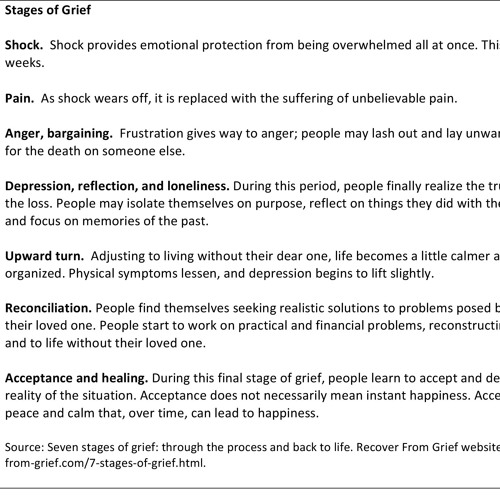

 Everyone needs their time. And six months is not much.
Everyone needs their time. And six months is not much.
Stage 4. Depression 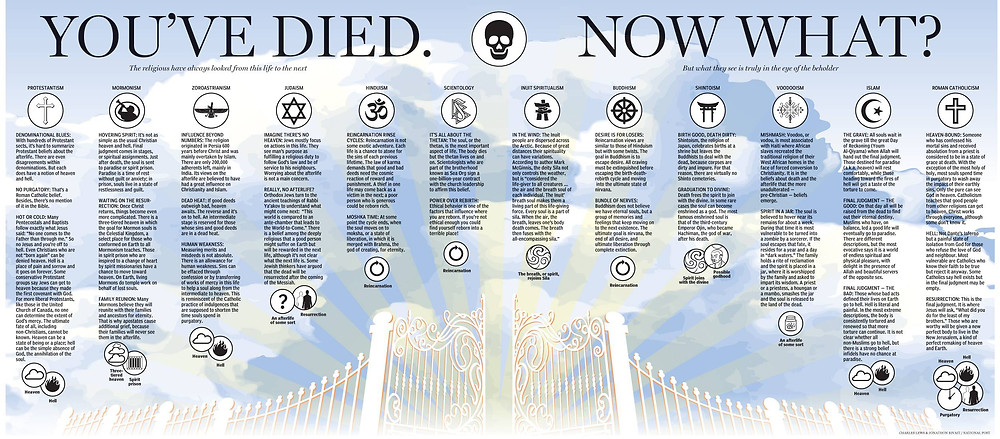
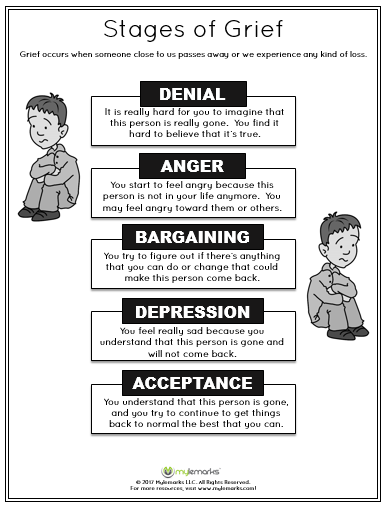
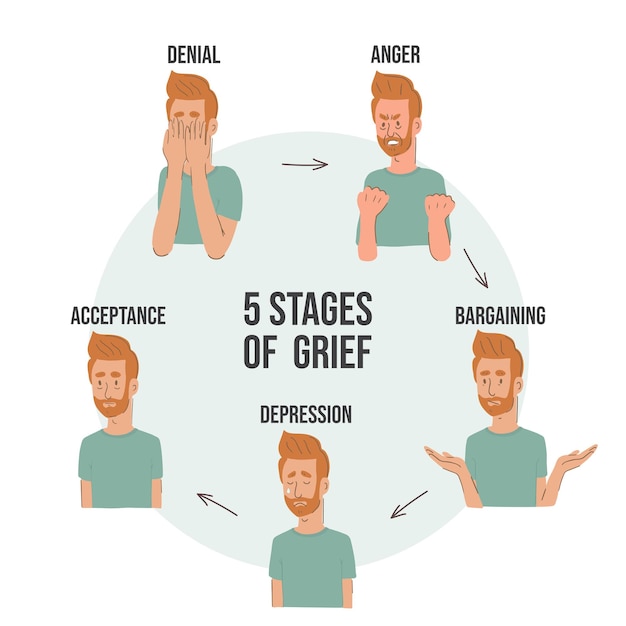
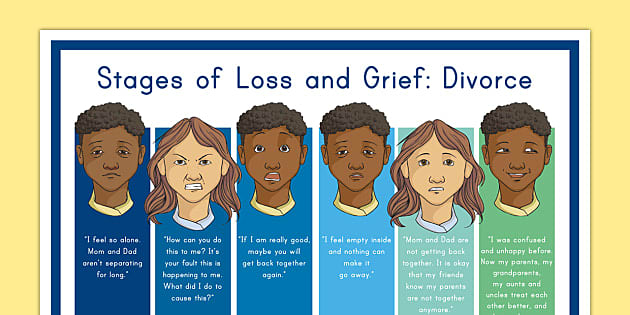 Try not to “cheer up” your loved one with generally accepted phrases - “Enough to be sad, we must live on” - they do not help, rather the opposite.
Try not to “cheer up” your loved one with generally accepted phrases - “Enough to be sad, we must live on” - they do not help, rather the opposite.
Stage 5. Adaptation
5 stages of accepting death and 12 steps on how to survive the death of a loved one
5 stages of grief acceptance
Feelings of a dying person
Classes grew into constant practice, a training course, and then Elisabeth Kübler-Ross wrote and published the book "On Death and Dying" , which became a bestseller.
Five stages of acceptance of death
At this moment he needs silence, he needs to prepare. The person is gradually moving away.
Amendments to the Kübler-Ross model
7 stages of grief
Scientific purity and accuracy are important for scientists, but it is enough for us to understand that pain is not eternal . The framework of the five (seven) stages does not define what to do - they give us the language to understand what happens to us when we grieve. How to survive grief depends, first of all, on ourselves.
12 Steps to Grieving
1. Accepting the fact of death
2. Everyone experiences grief in their own way
3. Shock and numbness
4. Loneliness causes depression
5. Prolonged stress is harmful to health
It happens that grieving people neglect a healthy diet and lifestyle, abuse alcohol, smoking or drugs.
6. One should not consider oneself flawed
7. Those who mourn experience guilt
Close friends, conversations at the Death Cafe, or counseling can help you deal with guilt.
8. Finding someone to blame
9. Speak out your emotions!
Don't keep grief to yourself!
10. Goals of life
11. Hope
12. Life goes on

